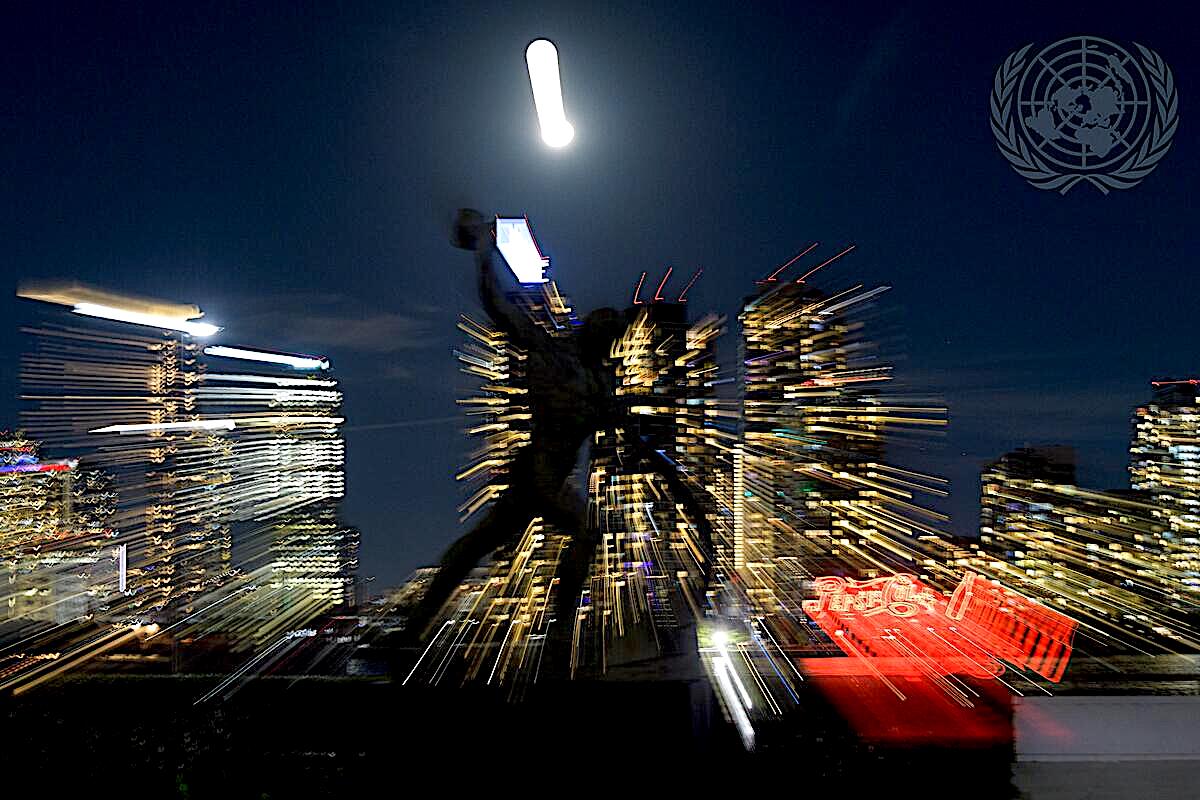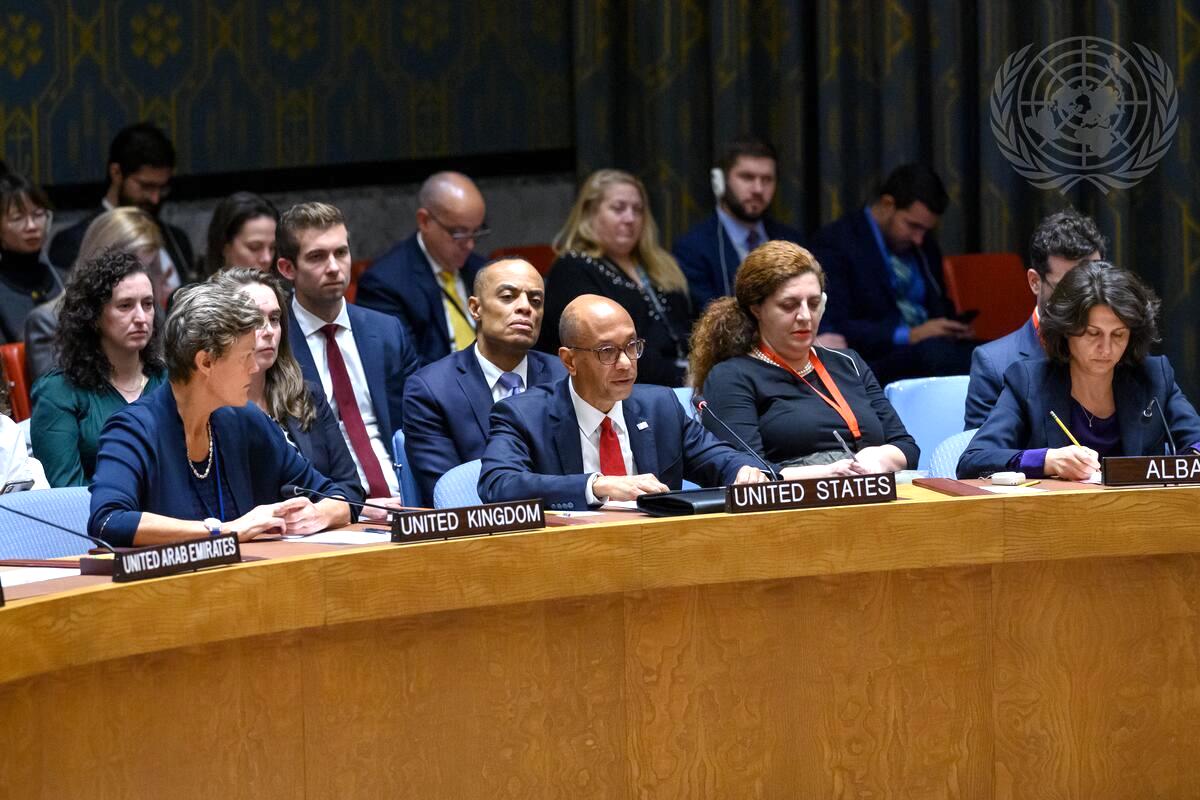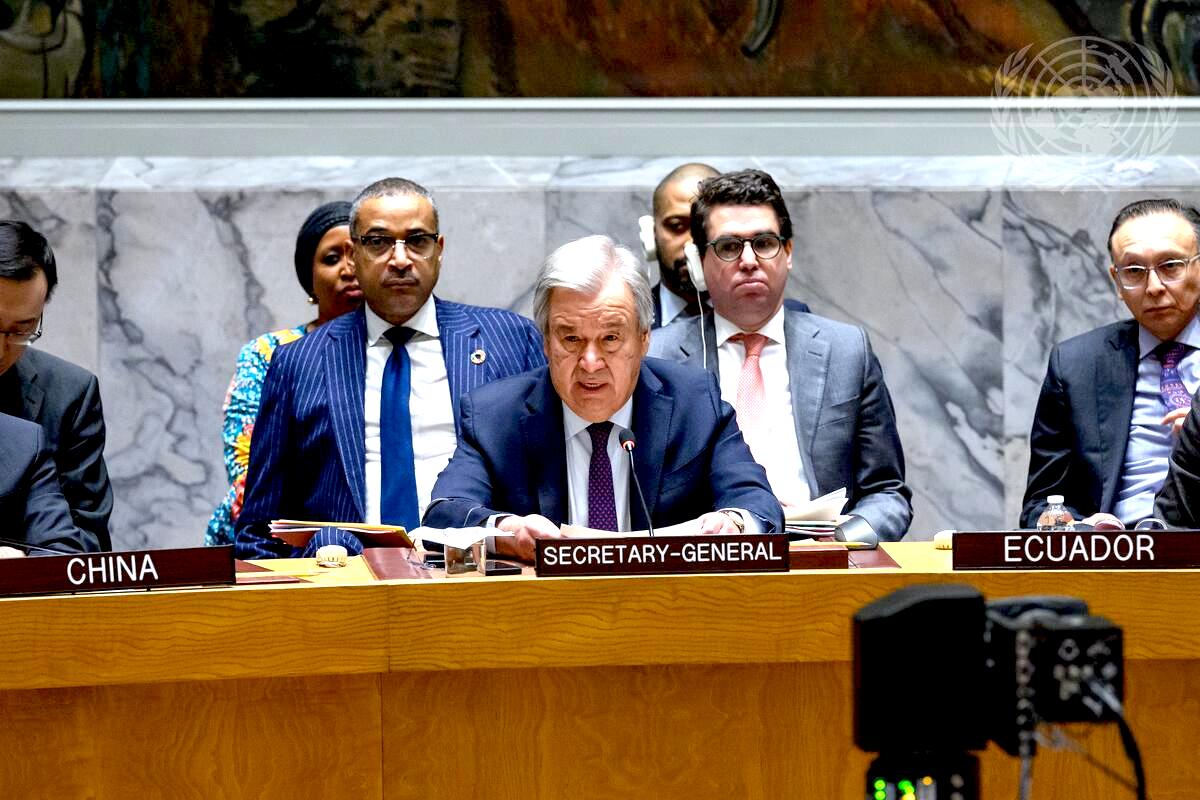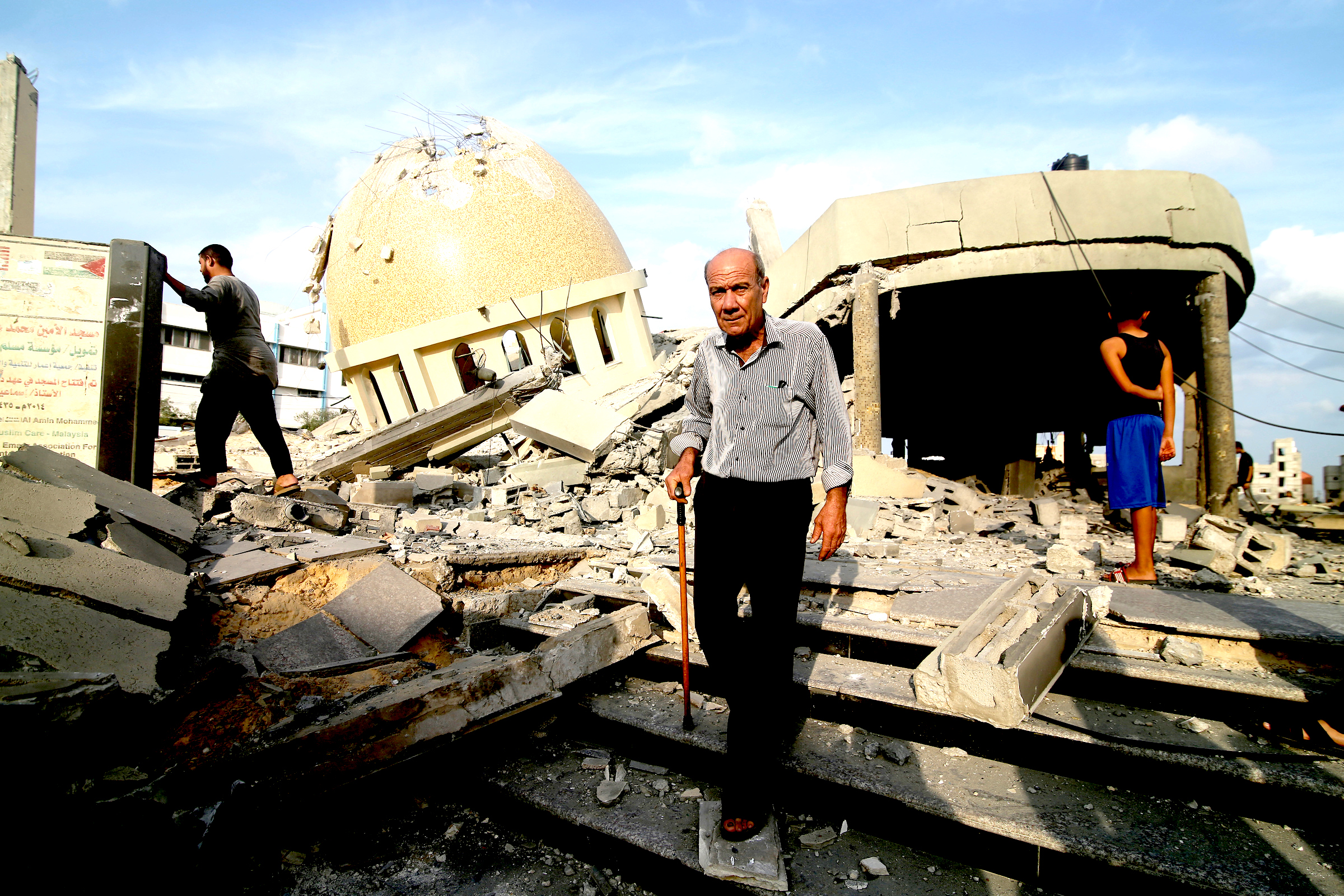United Nations Honor, United States Shame in Gaza
When Washington vetoed a ceasefire in Gaza Friday, it stood alone against international law as the U.K. — its tutor in imperial brutality — dutifully abstained, writes Jeffrey Sachs.

Long Island City, N.Y., skyline, with full moon behind the sculpture “Let Us Beat Our Swords into Ploughshares” at U.N. headquarters, Sept. 21, 2021. (UN Photo/Manuel Elías)
By Jeffrey D. Sachs
Common Dreams
 The nearly unanimous vote in the U.N. Security Council on Friday calling for an immediate ceasefire in Gaza is a moment of honor for the United Nations and shame for the United States.
The nearly unanimous vote in the U.N. Security Council on Friday calling for an immediate ceasefire in Gaza is a moment of honor for the United Nations and shame for the United States.
By voting to stop Israel’s war on Gaza by a vote of 13 yes, one no (U.S.), and one abstention (U.K.), the vast majority put itself on the side of international law. The U.S. stood alone against international law, with its sidekick and tutor in imperial brutality, the United Kingdom, dutifully abstaining.
[Related: What US Got Most Crucially Wrong in UN Veto]
U.N. Secretary-General Antonio Guterres honored the U.N. and human decency by invoking Article 99 of the U.N. Charter, calling for the U.N. Security Council to stop the killing in Gaza as a basic responsibility under the U.N. Charter.
Each day, U.N. officials on the ground in Gaza heroically struggle to feed, shelter and protect the population from Israeli bombs. More than 100 U.N. staff have been killed in the Israeli assault.
The situation in Gaza is as clear as it is brutal. The State of Palestine, recognized by 139 nations, has long suffered from the brutalities of Israeli occupation in Gaza and the West Bank. Gaza has been called the world’s largest open-air prison by Human Rights Watch.
After the Hamas-led horrific terrorist attack on Oct. 7, in which 1,200 Israelis died, Israel began to ethnically cleanse Gaza. Legal specialists at the Center for Constitutional Rights regard Israel’s actions as a genocide.
To date, more than 17,400 Gazans have been killed, and an unfathomable 1.8 million Gazans have been displaced. Tens of thousands are at risk of imminent death. Last month, Guterres warned that “Gaza is becoming a graveyard for children.” Israel pushed the population from northern Gaza to the south, and then invaded the south. Israeli authorities told Gazans to flee for their life to zones within the south, and then bombed the places to which the Gazans had been directed.
The U.S. is more than a protector of Israel. It is an accomplice. The U.S. supplies, in real-time, the munitions Israel uses for mass murder, even as U.S. authorities pay lip-service to Gazan civilian lives.

Robert A. Wood, deputy U.S. ambassador to the U.N., centre at table, on Dec. 8, when the U.S. cast the lone vote against a ceasefire in Gaza. (UN Photo/Loey Felipe)
The President of Israel Isaac Herzog justifies the slaughter by declaring that there are no innocent civilian Gazans: “It is an entire nation out there that is responsible.”
The Israeli government’s biggest lie is that Israel has no options other than the mass killing of Gazans, supposedly to defeat Hamas.
The fact that Israel was lulled by its arrogance into letting its guard down on Oct. 7 does not make Hamas an existential threat. Hamas has only a tiny fraction of Israel’s military might.
Oct. 7, like 9/11 in the U.S., was a colossal security blunder that should be immediately corrected by stepped-up border security, not an existential threat that in any remote manner justifies the killing of thousands or tens of thousands of innocent civilians, with women and children constituting 70 percent of the victims.
The killing frenzy is being led by the very same politicians who were responsible for the Oct. 7 security failure and who now manipulate the deepest anxieties of the Israeli population.
There is a larger and far more important point. Hamas can be demobilized through diplomacy, and only through diplomacy. Israel and the United States need finally to abide by international law, accept a sovereign state of Palestine alongside Israel, and welcome Palestine as the 194th member state of the U.N.

U.N. Secretary-General António Guterres on Dec. 8, as the Security Council met on a letter he had written invoking Article 99 of the U.N. Charter, asking the council to act on the humanitarian criss in Gaza. (UN Photo/Loey Felipe)
The U.S. needs to stop arming the Israeli operation of ethnic cleansing in Gaza and stop protecting Israel’s rampant violations of basic human rights in the West Bank. Fifty-six years after its illegal occupation of Palestinian lands, and after decades of illegal settlements in the occupied territories, Israel needs finally to withdraw from the occupied Palestinian lands.
With such steps, peace between Israel and the neighboring countries could and would be secured. On that basis, U.N. peacekeepers, including both Arab and Western troops, would in turn secure the Israel-Palestine border for a needed transition period. At the same time, all international flows of financing to anti-Israel militants would be choked off by joint and coordinated actions of the U.S., Europe and Israel’s Arab and Islamic neighbors.
The diplomatic route is open because the Arab and Islamic countries (including Iran) have once again reiterated their long-standing desire for peace with Israel as part of a peace agreement that establishes Palestine along the 1967 borders and its capital in East Jerusalem.
The real reason for Israel’s war in Gaza is that the government of Israel rejects the two-state solution, and points to extremists on the other side rather than to the Arab and Islamic states, which want peace based on the two-state solution.
Israeli zealots, including several in the cabinet, believe that God promised them all of the lands from the Euphrates to the Mediterranean. This belief is fatuous. As Jewish history should make clear to religious Jews, and as all human history should make clear generally, no group, whether Jewish or otherwise, has an unconditional “right” to any land.

Palestinians after an Israeli airstrikes in Khan Younis in the southern Gaza strip on Oct. 8. (Mahmoud Fareed, Palestinian News & Information Agency or Wafa, in contract with APAimages, CC BY-SA 3.0)
For rights to be secured and internationally respected in our day, governments need to abide by the international rule of law. In the case of Israel and Palestine, international law, as expressed repeatedly by the U.N. Security Council, holds that two sovereign states, Israel and Palestine, have both the right and responsibility to live side-by-side in peace according to the 1967 borders.
Not only Israel, but even perhaps more so the United States, has lost its way. The deep reason was clear to Senator J. William Fulbright 60 years ago, when Fulbright was chairman of the Senate Foreign Relations Committee, and wrote the magnificent book, The Arrogance of Power.
Fulbright pointed to arrogance as the deep cause of America’s reckless war in Vietnam in the 1960s. In its ongoing arrogance, the U.S. military-security state repeatedly ignores the will of the international community and international law because it believes that weapons and power enable it to do so. U.S. foreign policy is based heavily on covert, illegal regime-change operations and on perpetual warfare that caters to the U.S. military-industrial complex.
We must not become cynical about the U.N. It is currently blocked by the U.S., the country that led its creation under America’s greatest president, Franklin Delano Roosevelt.
The U.N. is doing its job, building international law, sustainable development and universal human rights, step-by-step, with advances and reverses, over the opposition of powerful forces, but with the arc of history on its side. International law is a relatively new human creation, still in the works. It is difficult to achieve in the face of obstreperous imperial power, but we must pursue it.
It is important to note that opposing Israel’s war crimes has absolutely nothing to do with anti-Semitism. This point has been made eloquently in an open letter by dozens of Jewish writers.
Israel’s Prime Minster Benjamin Netanyahu doesn’t speak for Judaism. The Israeli government violates the most sacred of all Jewish injunctions, to protect life (Pikuach Nefesh) and to love your neighbor as yourself (Leviticus 19:18).
The message of Jewish ethics is found in the words of the Prophet Isaiah (Isaiah 2:4) inscribed on a wall directly facing the United Nations: “They shall beat their swords into ploughshares, and their spears into pruning hooks; nation shall not lift up sword against nation, neither shall they learn war anymore.”
Jeffrey D. Sachs is a university professor and director of the Center for Sustainable Development at Columbia University, where he directed The Earth Institute from 2002 until 2016. He is also president of the U.N. Sustainable Development Solutions Network and a commissioner of the UN Broadband Commission for Development.
This article is from Common Dreams.
















